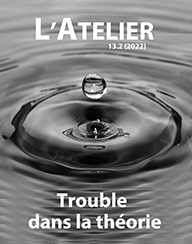La littérature sans majuscule, ou la puissance de l'inassimilable
Abstract
Today – as in earlier periods – literature (defined both as a body of writing and as an academic discipline) is often denigrated by those wishing to defend the Great Authors whose works are believed to illustrate a « mythical » (i.e., in the Barthesian sense, purely ideological) conception of the cultural past. Advocates of this approach generally assume that the literature of earlier periods constitutes a unified, monolithic whole whose meaning is not in doubt; this amounts to a wholesale repudiation of literary writing, whose specificity resides in the manner it lends itself to constantly renewed and perenially unstable interpretations. In the face of this attack, literary writing does not resort to open resistance; instead, it relies on the paradoxical power of self-effacement, on the logic of the « as if » (Derrida) which upsets the binary oppositions on which the embattled discourse of institutional self-preservation so crucially depends. As it glories in its insignificance and explores the ambiguous zone where speech becomes indistinguishable from silence (thus making sure that nothing can prevail against it), writing does not point accusingly at anyone or anything; instead, it is content with defying appropriation and refusing to be enlisted in any kind of « culture war ». A short story by Allen Barnett, « Succor », offers a striking illustration of this paradoxical strategy.
Downloads
Published
Issue
Section
License
- Work submitted for publication must be original, previously unpublished, and not under consideration for publication elsewhere. If previously published figures, tables, or parts of text are to be included, the copyright-holder's permission must have been obtained prior to submission.
- Authors of accepted manuscripts will assign to L'Atelier the right to electronically distribute their article, or publish it in any form (Internet, CD ROM, printed copy) but authors will retain copyright and, after the article has appeared in L'Atelier, authors may republish their text (in print and/or electronic form) as long as they clearly acknowledge L'Atelier as the original publisher.


